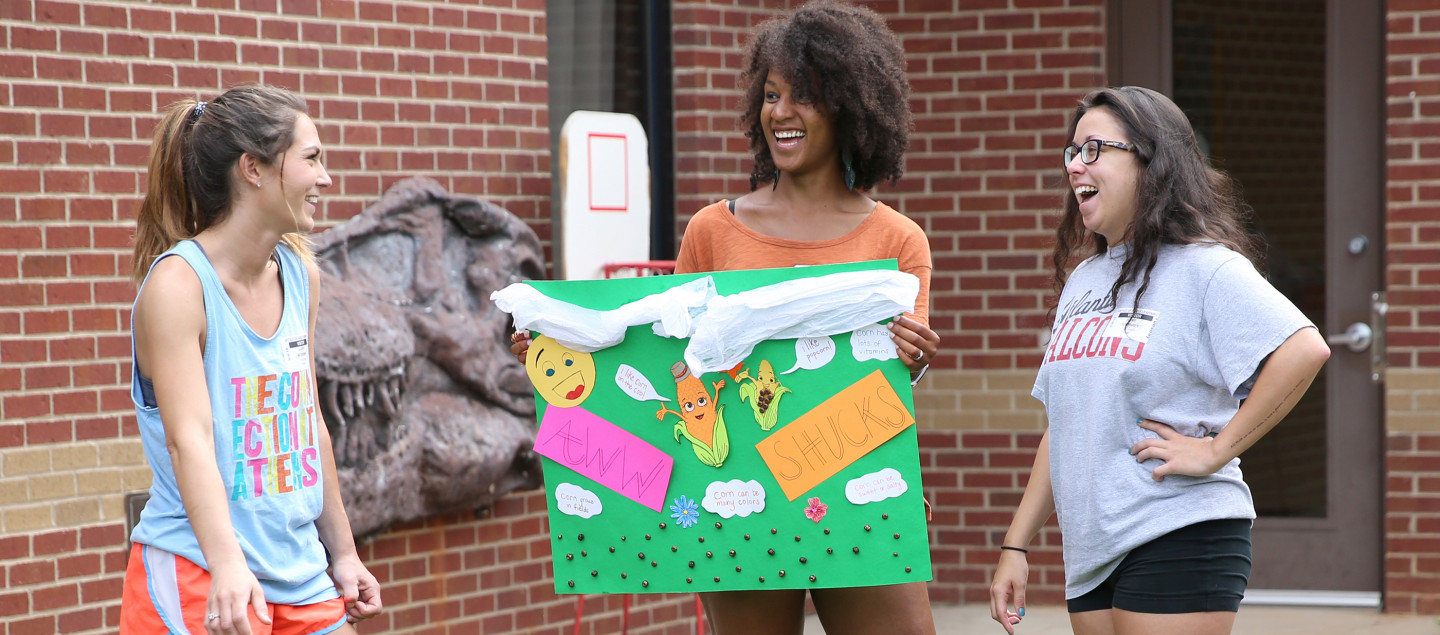Our Mission
The mission of the Childhood Obesity/Nutrition Intervention Laboratory is to:
- Create healthy early care and education environments to prevent obesity in our youngest children (ages 0-5), while working to decrease health disparities among low-income and minority populations
- Empower diverse communities and improve quality of life
- Develop, implement, and evaluate community based research models and innovative interventions
- Establish and sustain collaborative partnerships
- Foster personal growth and development of community members
Community Partners
- Easter Seals North Georgia, Inc.
- North East Georgia Food Bank
- Clarke County School District Office of School Nutrition
- Georgia Department of Early Care and Learning
Recent Awards
- Todd Chris Outstanding Outreach Award, 2018, Caree Cotwright
- Sweaney Innovation Fund, 2017, Caree Cotwright
- Georgia Trend Magazine 40 Under 40 Honoree, 2016, Caree Cotwright
- Best Poster Award, CURO Symposium, 2017, Camaria Welsh
- Centers for Disease Control and Prevention William Dietz Nutrition Award Nominee, 2015, Caree Cotwright
- Diverse Magazine Emerging Scholars Nominee (Scholarship/Research). Diverse Issues in Higher Education, 2014, Caree Cotwright
- University of Georgia Alumni Association Top 40 Under 40 Award Recipient, 2012, Caree Cotwright
- University of Georgia College of Family and Consumer Sciences Alumni Pacesetter Award Recipient, 2012, Caree Cotwright
View All Foods and Nutrition Awards
Media
- UGA Experts: Childhood Obesity
- TedxUGA 2016
- Athens Science Café
- Arts Article
- Undergrad Research (Facebook), (Instagram)
- Food Waste and Hunger Summit
Recent Conference Presentations
Cotwright, C and Bales, D. Society for Nutrition Education and Behavior (SNEB Annual Conference): Healthy Child Care Georgia: Improving Teacher Self-Efficacy to Implement Wellness Policies and Increase Wellness Education, July 30-August 2, 2016 in San Diego, CA,
Bales, D and Cotwright, C. The Administration for Children and Families' (ACF) National Research Conference on Early Childhood: Healthy Child Care Georgia: Evaluating the Effectiveness of a Collaborative Project to Improve Nutrition and Physical Activity in ECE; July 11-13, 2016, Washington, DC
Cotwright, C. 7th African American Collaborative Obesity Research Network (AACORN) National Workshop Interdisciplinary and Cross-Sector Approaches to Advancing Black Community Health: New Collaborations, The Use of Entertainment Education to Teach Nutrition Messages to Preschool Children: A Feasibility Study; August 17-19, 2016, Pennsylvania, PA
Alvis, C and Cotwright C. Pediatric Research Forum for Medical Students: Freggie and Friends: An Assessment of the Use of Characters to Improve Willingness to Try Fruits and Vegetables among Young Children; September 2-3, 2016, Orlando, FL
Current Research Projects and Service Learning
-
Wellness Policy Implementation in Georgia Child Care Centers
Childhood obesity increases risk for the development of chronic diseases such as diabetes, high blood pressure, heart disease, and in adulthood. Children develop healthy habits early in life, making early intervention extremely important. Sixty percent of American children are in some form of child care each week. As the ECE setting is particularly suited to advance obesity prevention efforts for young children, improving policy and best practice implementation to reduce rates of childhood obesity is a high priority. The overall goal of this study is to investigate implementation of wellness policies and practices in ECE centers participating in Georgia. The specific aims of the project are to: 1) Assess implementation of wellness practices and policies in child care centers participating in Georgia via a statewide survey; 2) Determine barriers to and facilitators of the adoption of wellness practices policies in ECE centers; and 3) Use findings to assist Georgia ECE stake holders in developing training to improve wellness policy implementation.
-
Healthy Child Care Georgia
Healthy Child Care Georgia (HCCG) is a pilot study supported by the USDA SNAP-Ed Program. HCCG tested the feasibility of using policy, systems, and environmental (PSE) approaches combined with direct classroom education for obesity prevention in the child care setting. While PSE approaches have delivered promising results in the child care setting, limited studies have combined both PSE approaches and with direct classroom education to promote change for obesity prevention. The HCCG study has four specific aims: 1) Increase ECE providers’ knowledge of wellness best practices for obesity prevention in early childhood; 2) Assess current status of wellness best practice implementation of ECE programs; 3) Create an action plan for the adoption at least one new wellness best practice in ECE program; and 4) Implement a six week intervention, Eat Healthy Be Active, to increase the quality and quantity of nutrition and physical activity education for children in ECE programs. Implementation of these policies and best practices in each ECE program has the potential to affect hundreds of SNAP-Ed eligible parents and their children.
Results from our formative work showed improvements in the implementation of nutrition and physical activity policies for participating child care programs as well as increased teacher knowledge and confidence and increased nutrition education in child care classrooms. The combined approached proved to be feasible and was well received by participants. Researchers are currently implementing HCCG with Head Start and Pre-Kindergarten classrooms in Athens-Clarke County, GA.
-
Freggie’s Green Machine
Young children have low fruit and vegetable intakes and are not meeting national recommendations for daily physical activity. Increasing fruit and vegetable consumption is a viable strategy to prevent chronic diseases such as diabetes, obesity, and stroke. One way to encourage higher intakes of fruits and vegetables among young children is via entertainment education. Entertainment education is the intentional placement of educational messages in an entertainment format (i.e. songs, puppet shows, games). Limited research has examined the use of entertainment education to increase fruit and vegetable consumption among preschool children. Even fewer studies have focused on using entertainment education to teach health messages to low-income children preschool children. Freggie's Green Machine is a nutrition education intervention for preschool children. The overall goal of this study is to assess the effectiveness of using an entertainment education nutrition intervention to improve willingness to try fruits and vegetables and food preferences among low income preschool children.
The intervention is grounded in Social Cognitive Theory, using nutrition theater performances to introduce specific fruits and vegetables to low-income preschool children and provide recipe tastings. The program includes nutrition lessons that are introduced by Freggie (fruits + veggies), a fun character who inspires healthy choices with his Green Machine (fruit and veggie cart). Freggie teaches children about nutrition through his friends, life-sized fruits and vegetables (program assistants in costume) to tell the story of the fruit or vegetable of the week. Children participate in a live show and recipe tasting to introduce 3 fruits and 3 vegetables (pears, blueberries, kiwi, sweet potatoes, carrots, and broccoli). The intervention includes 6 classroom sessions (once a week for 6 weeks) to learn health and nutrition information. In the spring of 2015, researchers conducted a feasibility study at a childcare center in Athens, Georgia for children ages 3 to 5 (Teachers n=8 and Children n=37). Results showed improvements in preschool children’s willingness to try fruit and vegetables. Teachers and parents reported high program satisfaction and that the children in the program related to the Freggie characters. Findings indicated that entertainment education is a feasible and promising way to teach nutrition messages to preschool children.
In spring 2016 researchers conducted a small scale pilot with two North Georgia Head Start Centers. These Head Start Centers serve low-income children ages 3 to 5 in Walton County, GA and Winder, GA. One center (Walton County Head Start: Center 1) served as the intervention site and one center (Winder Head Start: Center 2) served as the control site. All classrooms with children ages 3-5 at the intervention site (Center 1) l received the Freggie’s Green Machine intervention. Center 2 served as a control and received no treatment. The control center will receive the Freggie’s Green Machine program as a courtesy on a delayed schedule in Spring 2017. Researchers are currently analyzing data from this project.
-
Community Events and Service Learning
Community Events
Service Learning
- Aw Shucks Day: It is hard for school cafeterias to serve fresh corn to kids because it is labor intensive to shuck it. This has given school nutrition directors the idea to host an event that educates students about corn and allows them to eat it fresh in the cafeteria. Often called, “learning by doing,” service learning courses connect academic concepts learned in the classroom with real needs in the community. As a part of the service learning component of the FDNS 4660S course, students assisted the Clarke County School District (CCSD) School Nutrition Office and the CCSD Office of Early Learning to support Aw Shucks Day. On Tuesday, August 30, 2016 students traveled to the CCSD Early Learning Center to teach 3-5 year old children about corn and assist them in shucking corn. The children were served the corn that was shucked on the next day at school.


